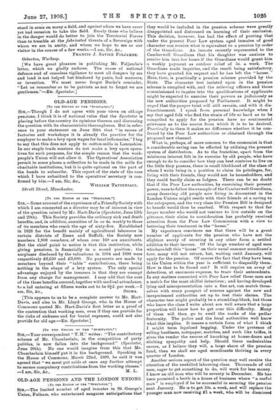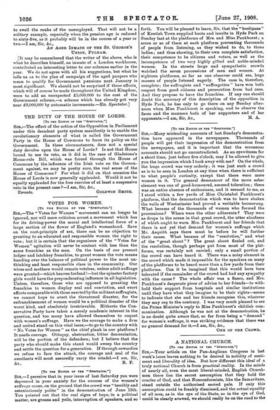OLD-AGE PENSIONS AND THE LONDON UNIONS. [To TIM EDITOR OF
THE " &Tar/amt.:] Sra,—The limited number of aged inmates in St. George's Union, Fulham, who entertained sanguine anticipations that
they would be included in the pension scheme were greatly disappointed and distressed on learning of their exclusion.
This decision, however, has had the effect of proving that under the present Poor Law system aged inmates of good character can receive what is equivalent to a pension by order of the Guardians. An inmate recently represented to the Camberwell Guardians that his daughter was anxious to receive him into her home if the Guardians would grant him a weekly payment as outdoor relief of 58. a week. The Guardians made inquiries, and the result being satisfactory, they have granted his request and he has left the "house." Here, then, is practically a pension scheme provided by the State. The character test insisted upon in the pension scheme is complied with, and the relieving officers and those commissioned to inquire into the qualifications of applicants might be expected to exercise their powers as judiciously as the new authorities proposed by Parliament. It might be urged that the pauper taint will still remain, and with it dis- franchisement. I speak front personal knowledge when I say that aged folk who find the strain of life so hard as to be compelled to apply for the pension have no sentimental grievance as to the source from which it is to be derived. Practically to them it makes no difference whether it be con. ferred by the Poor Law authorities or obtained through the proposed new channel.
What is, perhaps, of more concern to the economist is that a considerable saving can be effected by utilising the present system of distribution. As to the franchise, apart from the minimum interest felt in its exercise by old people, who have enough to do to consider how they can beet contrive to live on the little they possess, there is small likelihood of the chum df whom I write being in a position to claim its privileges, for, living with their friends, they would not be householders, and they could hardly claim as lodgers. There can be no doubt that if the Poor Law authorities, by exercising their present power, were to follow the example of the Camberwell Guardians, many deserving old people now living in discontent in the London Unions might reside with their friends at a saving to the ratepayers, and the very class the Pension Bill is designed to benefit would thus be reached. With respect to that far larger number who would not venture to live outside on the pittance, their claim to coneideration has probably received attention from the Poor Law Commission with a view to bettering their treatment in the "house."
My experience convinces me that there will be a great number of applicants for the pension who have not the slightest surety of securing in any other form a settled addition to their income. Of the large number of aged men who have left this "house" on their usual summer mendicant's tour„ many will not return, but, waiting until January, will apply for the pension. Of course the fact that they have been in the Union within the year is sufficient to disqualify them. How is that to be found out? It will require an army of detectives, at enormous expense, to trace their antecedents. In any matters connected with Poor Law relief these men are a match for the most skilful detectives ; and having developed lying and misrepresentation into a fine art, can match them- selves with every prospect of success against the new and inexperienced authorities set up to test their claims. The character test might probably be a stumbling-block, but those who know the class I write about are well aware that a large proportion will know how to get over this difficulty. Many of them will then go to swell the ranks of the pedlar fraternity. The police and the local authorities well know what this implies. It means a certain form of what I think I might term legalised begging. Under the pretence of selling bootlaces, noteps.per,.matches, and such like trifles, it gives the vendor the excuse of knocking at house7doors and eliciting sympathy and help. Should these undesirables secure, as I believe they will, a large share of the pension fund, then we shall see aged mendicants thriving in every quarter of London.
Another serious aspect of the question may well receive the attention of the unskilled labouring class. Thousands of old men, eager to get something to do, will work for less money. I know an old man who will be seventy in December. He has been promised a berth in a house of business where "a useful man" is employed if he be successful in securing the pension next January. He is to get 10s. a week, and will replace the younger man now receiving £1 a week, who will be dismissed to swell the ranks of the unemployed. That will not be a solitary example, especially when the pension age is reduced to sixty-five, as it probably will be in the course of a year or two.—I am, Sir, &c., AN AGED INMATE OF THE Si'. GEORGE'S UNION, FULHAM.
[It may be remembered that the writer of the above, who is what be describes himself, an inmate of a London workhouse, contributed an interesting letter to our columns earlier in the year. We do not agree with all his suggestions, but what be tells us as to the plan of campaign of the aged paupers who mean to qualify for Government pensions next January is most significant. We should not be surprised if these efforts, which will of course be made throughout the United Kingdom, were to add an unexpected £5,000,000 to the cost of the Government scheme,—a scheme which has already got very near £8,000,000 by automatic increments.—En. Spectator.]























































 Previous page
Previous page